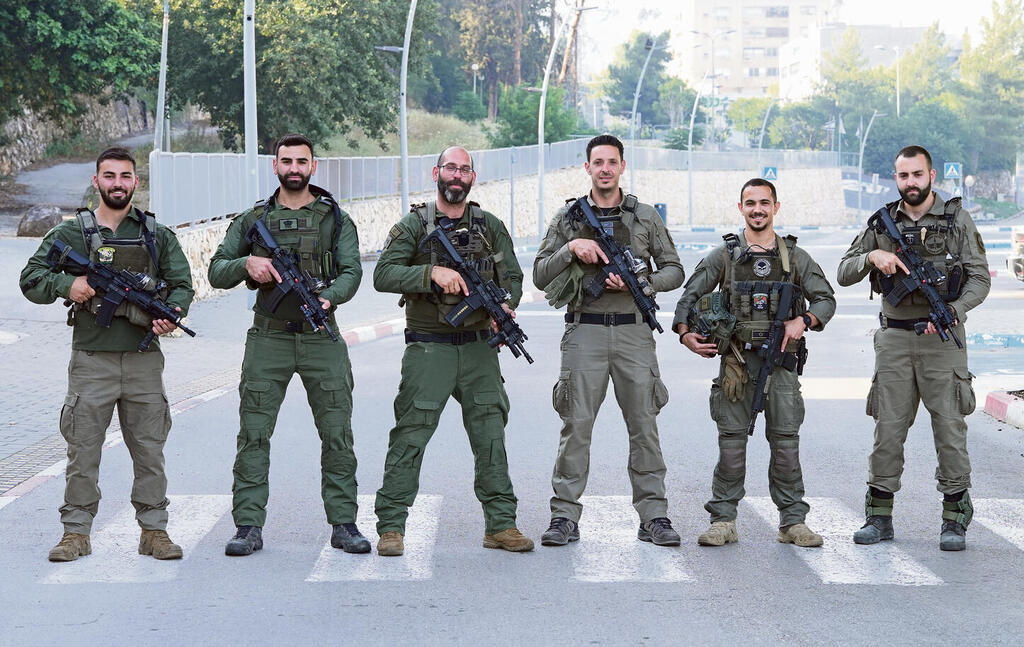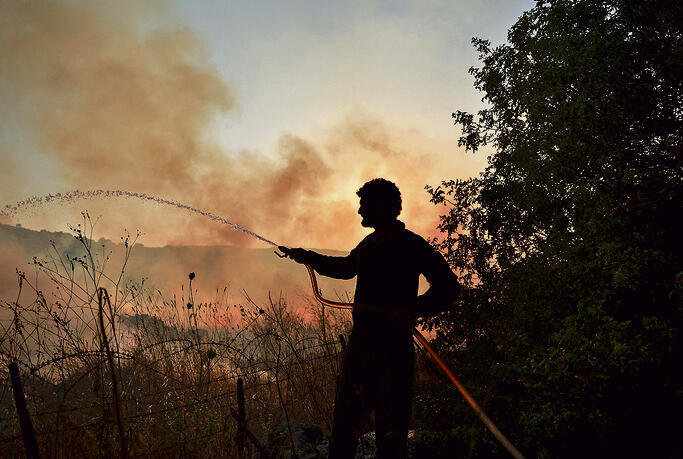Getting your Trinity Audio player ready...
Late Monday night, fighters from the Kiryat Shmona defense unit responded to a burning building and found an elderly woman trapped on the first floor. "She doesn't speak Hebrew and wasn't aware of the commotion outside," says Israel Akuka, a member of the emergency squad who rescued her. "I knocked hard on the air conditioner outside until she heard us and opened the door. A police officer with me evacuated her to the police station."
The local fighters battled the intense blaze, fueled by a storage room filled with toxic materials, managing to prevent the entire building from burning down. That evening, six of them had to be evacuated to the Ziv Medical Center in Safed, suspected of having suffered irreversible lung damage. After several hours of tests, they returned to the city, with some even rejoining their comrades to continue rescue efforts.
Firefighters and soldiers, all in one
Until Hezbollah's relentless attacks and the constant rocket fire on evacuated northern communities, which have now turned into a frontline security zone, Kiryat Shmona did not have an organized emergency squad. The squad was established over several weeks as combat unit veterans from the city took responsibility and led its creation. They need additional manpower and would welcome tactical combat equipment to improve their readiness and operational capabilities. Currently, the squad includes several dozen reservists who were not trained to deal with fires.
Originally, their purpose was to provide immediate and local response to a Radwan unit attack attempting to conquer the Galilee. However, like emergency squads in dozens of evacuated communities, tactical needs have evolved and now they bear a greater responsibility in an area abandoned by its residents.
"None of us were trained to be firefighters," said Ron Moisescu, a member of the reserve fighters' company, drafted to defend the city since October. He explained, "We were trained to fight enemies; we know how to handle weapons and open zigs when needed, and to be soldiers. I've never fought a fire or been trained for it beyond operating a fire extinguisher. It can be intimidating, but we're here to do whatever is needed to protect the city."
Moisescu himself was affected by the thick, heavy smoke that enveloped Kiryat Shmona for hours, and it still lingered when we visited to assess the damage. In their company room in the municipal building, the sound of heavy, raspy coughs was constant. They apologized, explaining it was a lingering effect from recent events, and they hoped it would pass quickly.
"Unlike kibbutzim or other places, we are here 24/7 because of the large urban area, providing both municipal and security responses," said Lt. Col. (res.) Guy Ohayon, the security officer of Kiryat Shmona. He added that his soldiers are ready to meet almost any need in a city where only about 3,000 of its 24,000 residents remain, most of them elderly and sick.
Fire in Kiryat Shmona
(Video: Yishay Elharar)
"We're here from end to end. From feeding cats on the street because there are no residents to do it, to distributing food to elderly residents on Fridays. Even a memorial service or digging a grave for someone who passed away. We prepare ourselves for terrorist response scenarios and train for it constantly, but we understand that we are needed for much more."
The fire in the city burned for more than 20 hours. Like in dozens of hotspots across the Galilee and Golan, firefighters faced a massive event where everyone who could help, jumped in to assist. Emergency squads from nearby kibbutzim, the "orange firefighters" of the Home Front Command, teams from the Upper Galilee Regional Council, Upper Galilee Water and Police forces all arrived to aid Kiryat Shmona, where many homes were threatened by an immense wall of fire.
The uncertainty of protecting a ghost town
Fighters from the city's defense unit, left alone in their homes for months as their families have not entered the city gates, cope with the high tension and worry. "No one is under the illusion that we came here to rest," said Moisescu. "We have to risk ourselves against terrorists, fire, and building ruins. We're here to do everything so that our neighbors and friends can return and have a place to come back to."
Yogev Cohen, a father of two who has been living with his family in the northern community of Migdal since October, said, "There's no chance my wife and kids will come here; they're very scared." He described the place that was once a safe haven for them. "They worry about me a lot, and whenever there's shooting or a drone attack on the city, I tell them everything is fine."
The atmosphere in the city's streets is tense. The few cars that pass through drive quickly with open windows, ready to hear any siren and take immediate cover. The warning time here is zero, and the constant soundtrack is the echoes of IDF shelling southern Lebanon. "This is definitely not the place we grew up in. I think twice before going out on the street. Rockets exploded near our friends, and shrapnel flew over their heads or hit their helmets in sudden barrages," testified Ohad Kadosh.
He added with frustration, "This reality is exhausting. I don't know what the future holds or when this will end." His friend Idan Haziza, drafted into the reserve company straight after finishing his regular service, returned to the city directly from Gaza. "Kiryat Shmona is much more dangerous than Gaza; I feel like I'm in a duck shoot."
The city's defense company fighters never imagined what it would be like to miss home while living in it, as everything familiar fades away. For months, their home walls haven't seen family Shabbat meals, birthday parties, or small moments of grace. "In today's situation, if they announce an agreement trusting Hezbollah to withdraw, there's still no chance I'll bring my wife and kids back here," said Yogev Cohen.
"For me, it's either going to war or staying in Migdal. We've seen what these agreements are worth." Over the past eight months, more than 1,025 property damage claims have been filed in Kiryat Shmona, including 224 vehicles damaged by Hezbollah fire. The city's infrastructure has been severely damaged. "I understand that even after the war, there won't be much to return to because it will take time to rebuild the city, but I don't want to give up my home," Cohen added. "We all understand this is going to take quite a while. We'll stay here in the city's defense company for as long as we're needed."







